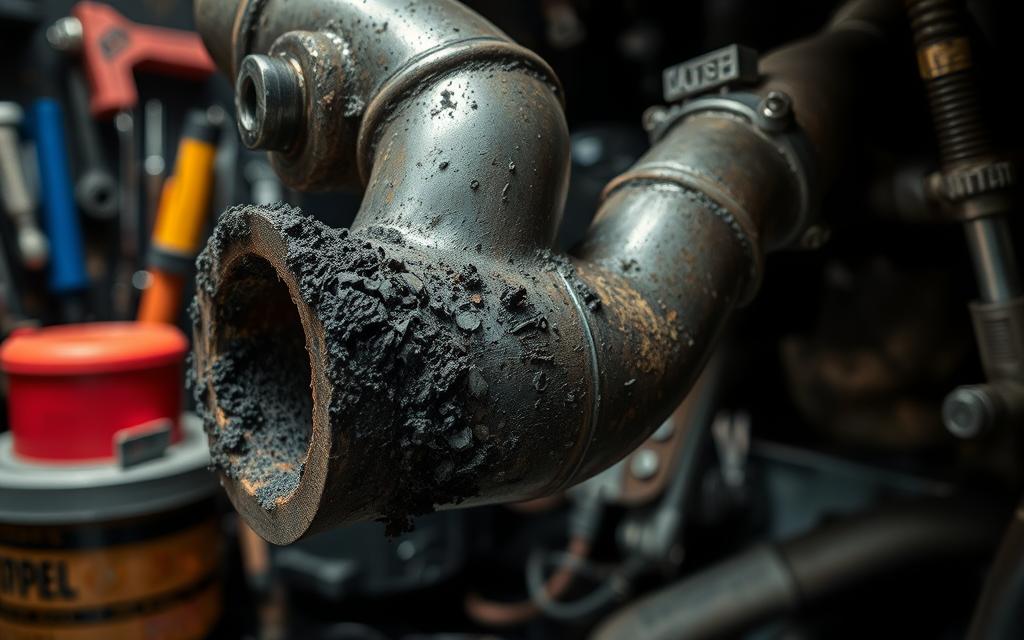A well-working exhaust system is key for a vehicle’s performance and efficiency. But, a clogged exhaust manifold can cause big problems. Knowing the signs of a clogged exhaust manifold helps drivers fix issues before they get worse.
Key Takeaways
- A clogged exhaust manifold can cause reduced engine performance, increased fuel consumption, and unusual noises.
- The exhaust system is responsible for removing harmful emissions and reducing engine noise, and its malfunction can lead to serious problems.
- Recognizing the early warning signs of a clogged exhaust manifold is essential to prevent costly repairs and maintain vehicle efficiency.
- Symptoms such as decreased acceleration, engine misfiring, and unusual odors may indicate a problem with the exhaust manifold.
- Regular maintenance and early detection of exhaust system issues can help ensure the vehicle’s overall health and longevity.
Understanding the Exhaust Manifold’s Role
The exhaust manifold is key in a vehicle’s engine system. It collects exhaust gases from multiple cylinders and sends them to the exhaust pipe. This ensures the engine runs well, uses fuel efficiently, and meets emissions standards.
What is an Exhaust Manifold?
The exhaust manifold is usually made of cast iron, heavy-duty sheet metal, or stainless steel. It gathers hot exhaust gases from each cylinder and directs them into a single pipe. This helps the engine get rid of waste gases smoothly, keeping performance consistent.
Importance of Exhaust Flow
Good exhaust flow is vital for the engine’s health and performance. If the exhaust manifold gets clogged, it causes backpressure. This makes the engine work harder, leading to less power, worse fuel economy, and more emissions.
The Impact on Vehicle Performance
A working exhaust manifold is crucial for the vehicle’s performance. If it’s clogged or damaged, it can cause many problems. These include less engine power, slower acceleration, and more fuel use. It can also cause the engine to overheat, misfire, and damage other parts like the catalytic converter.
“A clogged or damaged exhaust manifold can significantly compromise a vehicle’s performance, leading to a range of issues that can affect the engine’s overall health and efficiency.”
Recognizing Warning Signs
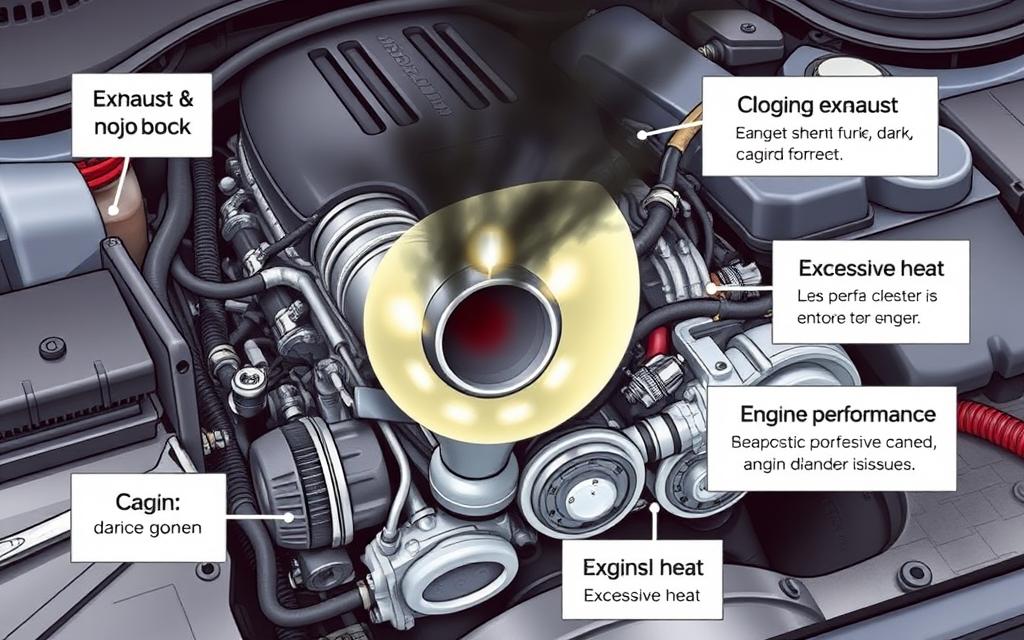
It’s important to watch for signs that your vehicle’s exhaust system might be having trouble. Ignoring these signs can cause bigger and more expensive problems later. By knowing the common signs of exhaust system issues, you can fix them quickly and keep your vehicle running well.
Common Symptoms to Watch For
- Strange noises from the exhaust system, like rumbling, rattling, or hissing
- Unusual vibrations or shaking in the vehicle, often when you’re speeding up or idling
- Less power from your engine, slower acceleration, and worse fuel efficiency
- Bad smells from the exhaust, like rotten eggs or sulfur, which can mean a leak or blockage
When to Seek Professional Help
If you see any of these signs, get your vehicle checked by a professional exhaust repair expert. Not fixing these problems can cause serious damage, like to the catalytic converter or engine. A skilled mechanic can find the problem and fix it, making sure your exhaust system works right again.
Regular checks and maintenance of your exhaust system can stop small problems from getting big. By being alert and fixing issues fast, you can keep your vehicle’s exhaust system working well. This saves you time and money in the long run.
Decreased Engine Performance
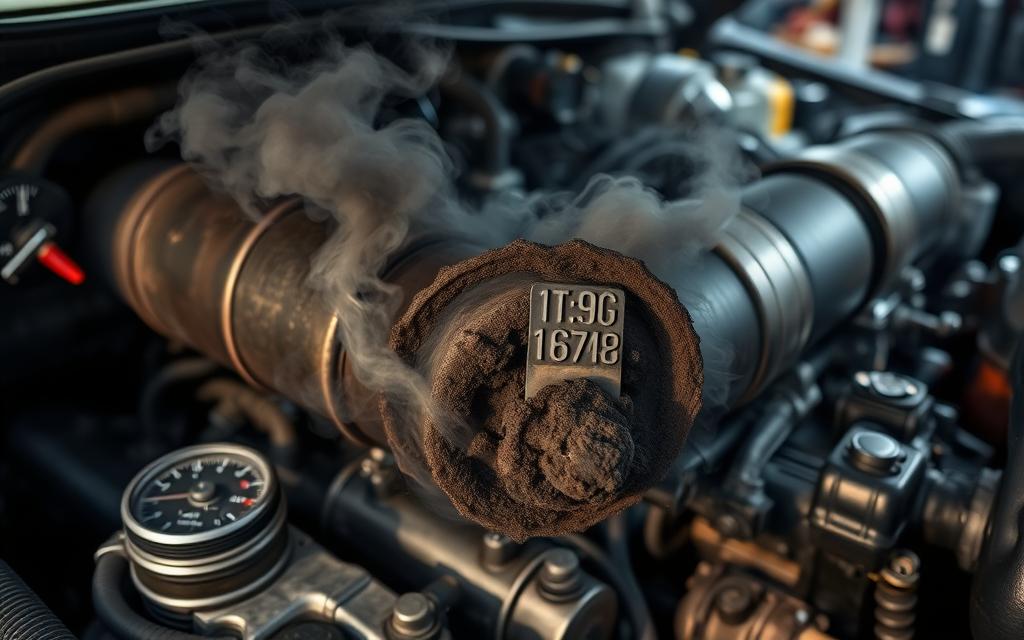
A clogged exhaust manifold can really hurt your car’s engine. It makes it hard for the engine to get rid of exhaust gases. This leads to less power and slower acceleration.
Symptoms of Reduced Power
Drivers with a clogged exhaust manifold might feel less power when speeding up or going up hills. The engine might not go as fast or feel slow, even when it’s heavy or trying to pass others. This is a common sign of a blocked exhaust system.
Acceleration Issues
Poor acceleration is another sign of a clogged exhaust manifold. Your car might take longer to get to the speed you want or feel weak when you try to speed up fast. This can be really annoying when you’re trying to get onto highways or move through traffic.
Having less power and poor acceleration makes driving hard and less fun. It’s important to fix a clogged exhaust manifold quickly to get your car running well again.
| Symptom | Impact | Solution |
|---|---|---|
| Reduced Engine Power | Sluggish acceleration, difficulty maintaining speed | Inspect and clean or replace the exhaust manifold |
| Poor Acceleration | Slow response when pressing the accelerator, difficulty merging | Diagnose and address the clogged exhaust issue |
Unusual Engine Noises
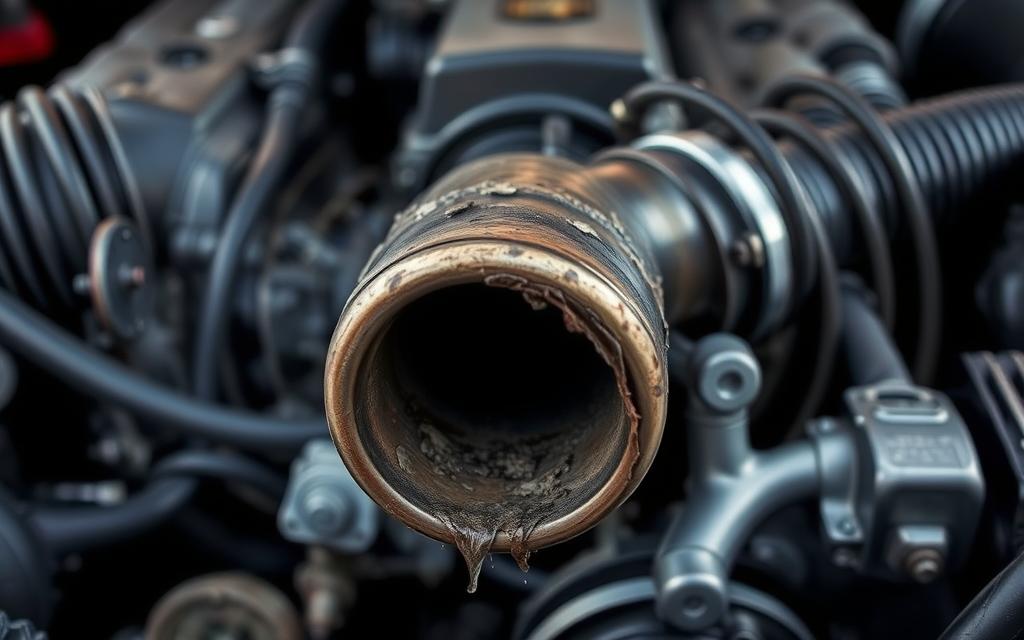
One of the most telltale signs of a clogged exhaust manifold is unusual engine noises. These can include hissing, rattling, knocking, and tapping sounds. Each sound hints at a different problem in the exhaust system.
Sounds Indicative of Clogging
A clogged exhaust manifold can make a variety of noises. You might hear hissing, rattling, or even popping sounds. These sounds come from restricted airflow, causing turbulence and vibrations in the exhaust system.
Loose parts in the exhaust system can also cause rattling noises. This is more noticeable when driving over bumps or when you accelerate.
Knock or Tapping Noises Explained
Knocking or tapping noises when starting the car or during acceleration suggest a leak in the exhaust manifold gasket. These sounds happen when exhaust gases leak through a crack or hole in the manifold. This can cause a loss of engine power and efficiency.
| Symptom | Possible Cause |
|---|---|
| Hissing, rattling, or popping sounds | Clogged exhaust manifold |
| Knocking or tapping noises | Exhaust manifold gasket leak |
| Loud engine noise | Muffler or catalytic converter issues |
| Whistling noise | Oxygen sensor problems |
Don’t ignore unusual engine noises. They can signal bigger problems in the exhaust system. These issues can affect your vehicle’s performance and efficiency. If you hear any of these sounds, get your car checked by a skilled mechanic to find and fix the problem.
Increased Fuel Consumption

A clogged exhaust manifold can really hurt your fuel efficiency. The engine works harder to get rid of exhaust gases. This means you use more fuel, which is a big problem for heavy-duty trucks.
How a Clogged Manifold Affects Efficiency
When the exhaust manifold gets clogged, the engine has to work harder. It needs more fuel to keep running well. This can also lead to other problems, like worse engine performance and more emissions.
Signs of Worsening Gas Mileage
- Needing to refuel more frequently
- Observing a decrease in miles per gallon (MPG)
- Experiencing a noticeable drop in overall fuel efficiency
These signs show your gas mileage is getting worse. The engine is struggling because of the clogged exhaust manifold.
“Poor fuel efficiency can be a significant indicator of a clogged exhaust manifold, leading to a substantial decrease in fuel efficiency in heavy-duty trucks.”
| Symptom | Potential Cause | Impact on Fuel Efficiency |
|---|---|---|
| Loud exhaust noises | Issues with the exhaust system | Increased fuel consumption |
| Clogged catalytic converter | Impeded exhaust gas flow | Reduced fuel efficiency |
| Excessive exhaust smoke | Problems in the exhaust system | Decreased fuel efficiency |
Fixing these problems quickly can help your exhaust system work right again. This will improve your fuel efficiency. It will also save you money and help the environment.
Overheating and Cooling System Issues
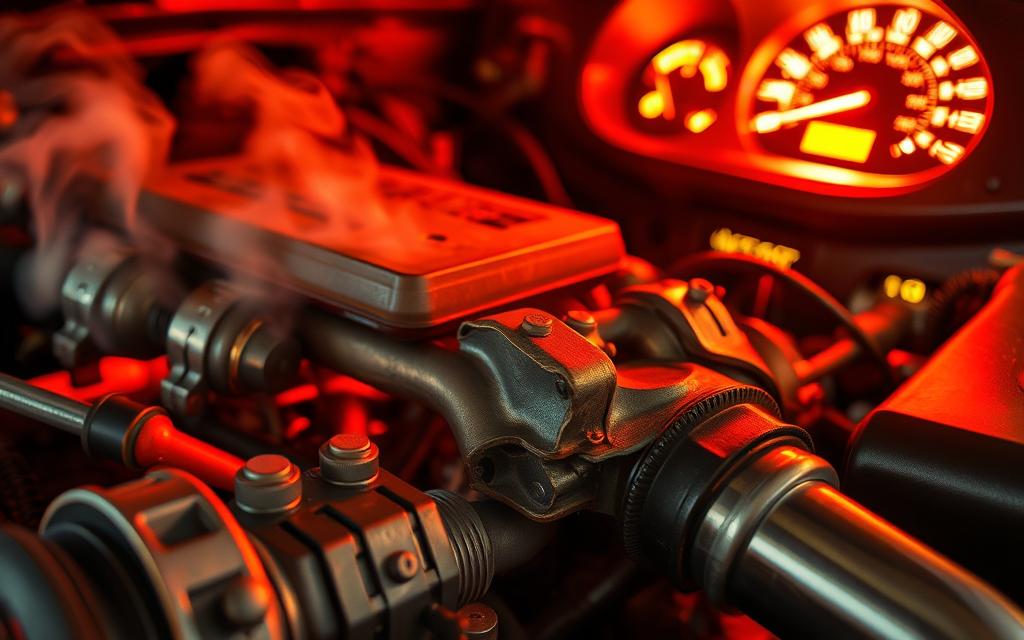
A clogged or malfunctioning exhaust manifold can harm your vehicle’s engine and cooling system. When the exhaust system is blocked, hot exhaust gases can’t flow properly. This makes the engine run too hot, which can damage important engine parts if not fixed quickly.
Connection Between Overheating and Exhaust Manifold
The exhaust manifold helps move hot exhaust gases away from the engine. If it’s clogged, these gases can’t escape, causing the engine to get too hot. This heat can overload the cooling system, leading to more problems.
Signs of Overheating
Exhaust-related overheating can show in several ways, like:
- Steam or smoke coming from under the hood
- A hot, burnt smell from the engine area
- The temperature gauge showing a high reading or the engine warning light turning on
Ignoring overheating can cause serious engine damage. This includes things like warped cylinder heads or a seized engine. It’s important to fix overheating issues fast to avoid expensive repairs.
| Symptom | Potential Cause | Recommended Action |
|---|---|---|
| Steam/Smoke from Engine | Overheating due to clogged exhaust manifold | Inspect and clean or replace the exhaust manifold |
| High Temperature Gauge Reading | Cooling system issues exacerbated by exhaust manifold blockage | Diagnose and address cooling system problems, then inspect exhaust manifold |
| Engine Warning Light Illuminated | Engine overheating caused by exhaust-related problems | Scan for diagnostic codes and address underlying exhaust manifold issues |
Knowing how a clogged exhaust manifold can cause engine overheating helps you take care of your vehicle. This can prevent expensive repairs later on.
Engine Warning Lights
Your vehicle’s dashboard alerts you to system issues, like exhaust problems. The check engine light is key to watch. It warns of many issues, including exhaust system problems. Ignoring it can cause more damage and higher repair costs.
Dashboard Alerts You Shouldn’t Ignore
The check engine light turns on when the vehicle’s computer finds a problem. This can be from a loose gas cap to serious issues like a clogged catalytic converter. It’s crucial to take this light seriously and fix the problem quickly.
Diagnostic Codes Related to Exhaust Issues
When the check engine light comes on, your car’s computer saves a code. This code tells you about the problem. Some codes point to exhaust system issues, like a clogged exhaust manifold or a bad catalytic converter. Knowing these codes helps mechanics find and fix the problem fast.
| Diagnostic Code | Potential Issue |
|---|---|
| P0420 | Catalytic Converter Efficiency Below Threshold |
| P0430 | Catalytic Converter Efficiency – Bank 2 |
| P0441 | Evaporative Emission Control System Incorrect Purge Flow |
| P0456 | Evaporative Emission Control System – Small Leak Detected |
By watching dashboard lights and understanding diagnostic codes, you can fix problems early. This keeps your vehicle’s exhaust system running well.
Smoke Emissions

Smoke coming from your car’s exhaust can mean there’s a problem. A little vapor is okay, but too much smoke is a warning. Knowing what different colors of smoke mean can help you fix issues early.
Decoding Smoke Signals
The color of the smoke from your car’s tailpipe tells you a lot:
- White smoke might mean coolant is getting into the engine, which could be a sign of a leak.
- Blue smoke usually means oil is burning, which could be because of worn engine parts.
- Black smoke often shows a car is burning too much fuel, possibly because of a clogged air filter.
When to Worry About Smoke
If your car’s exhaust is always smoking, you should get it checked by a mechanic. Not fixing this can cause more damage and cost more money later. Fixing smoke issues early keeps your car running well and saves the environment.
“Regular exhaust system maintenance can prevent harmful pollutants like hydrocarbons, carbon monoxide, and nitrogen oxides from entering the atmosphere.”
In Pennsylvania, cars must meet strict emissions rules to protect the environment. Fixing exhaust problems fast helps avoid fines and keeps your car in top shape.
Changes in Exhaust Odor
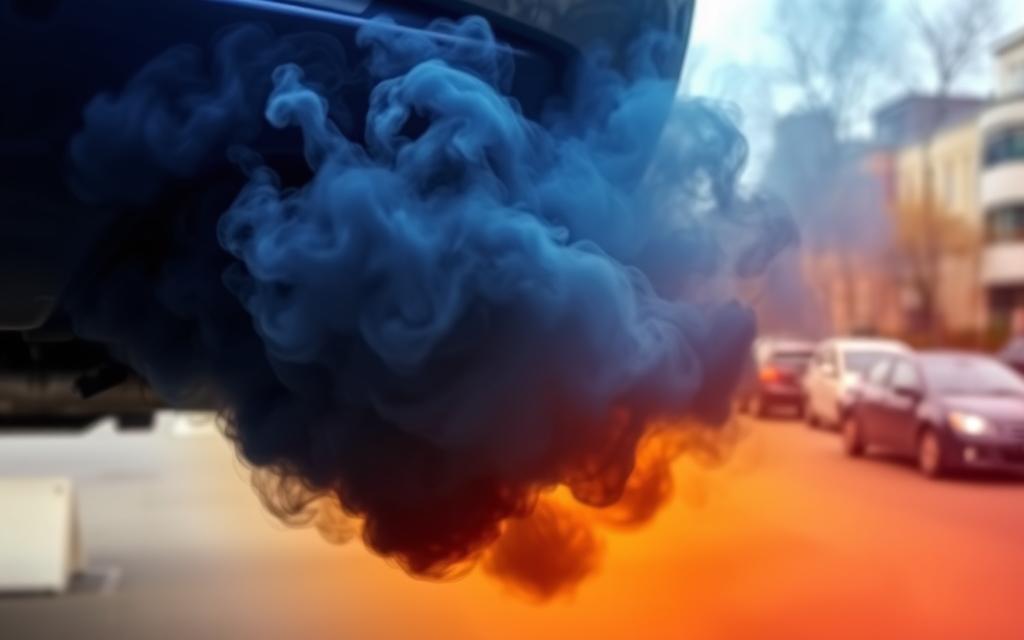
The smell of your car’s exhaust can tell you a lot about its health. A slight smell is okay, but any unusual or lasting smells mean you should check it out.
Unusual Smells Related to Exhaust Issues
A strong exhaust smell inside the car is a big warning sign. It means there might be a leak that lets harmful gases in. A smell like sulfur or rotten eggs could mean the catalytic converter is failing. These smells are serious and can harm your health and safety.
Differentiating Between Normal and Problematic Odors
- A slight, occasional exhaust smell is generally normal and not a cause for concern.
- Persistent or strong exhaust odors inside the vehicle, exhaust leak that needs to be addressed.
- A sulfuric or rotten egg-like smell could point to issues with the catalytic converter.
- Any unusual or strong exhaust odors should be investigated promptly to ensure the safety and proper functioning of your vehicle’s exhaust system.
Noticing changes in your car’s exhaust smell can help you catch problems early. Fixing these issues quickly keeps your exhaust system safe and efficient. This ensures your car runs smoothly and reliably.
Vehicle Vibrations and Rough Idling
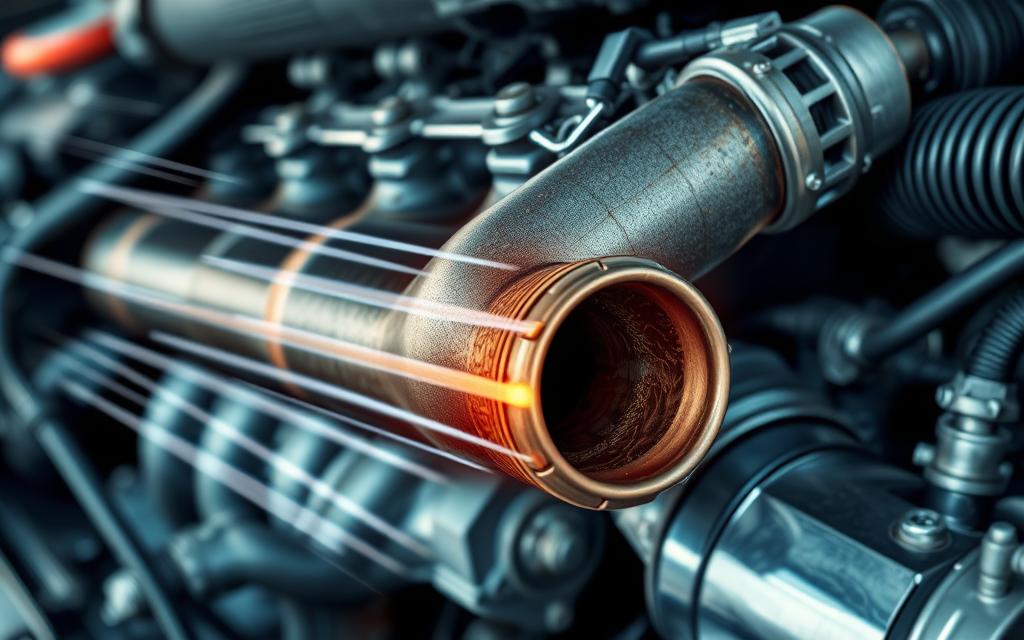
A clogged exhaust manifold can really affect your car’s performance. It causes engine vibrations and rough idling. These problems happen because exhaust gases can’t flow smoothly, leading to uneven pressure in the engine.
How Clogging Affects Engine Vibration
When the exhaust manifold gets clogged, it blocks the exhaust gases’ flow. This blockage makes the engine vibrate more. The uneven pressure and combustion lead to inconsistent power delivery.
The vibrations are most noticeable when the car is idling or accelerating. The engine has trouble keeping a steady rhythm.
Signs of Rough Idling
- The vehicle shaking or vibrating noticeably when stationary, specially at stop lights or in park
- Fluctuating engine speed, with the RPMs rising and falling erratically
- Difficulty starting the engine, or the engine stalling at idle
- A rough or uneven engine sound, compared to the typical smooth idle
These signs of rough idling might mean there’s a problem with the exhaust manifold. It’s important to fix it quickly to avoid more problems. Ignoring these signs can harm your car’s fuel efficiency, engine performance, and even damage other parts.
| Measurement | Healthy Engine | Clogged Exhaust Manifold |
|---|---|---|
| Idle Speed (RPM) | Approximately 1,000 RPM | Fluctuating, with uneven idle speed |
| Engine Vibrations | Minimal, smooth operation | Increased, with noticeable shaking |
| Fuel Efficiency | Optimal, according to manufacturer specs | Decreased, due to inefficient combustion |
Fixing the exhaust manifold issue can make your car run smoothly again. Regular maintenance and quick action to engine changes are crucial. They help keep your car running smoothly and avoid expensive repairs.
Impact on Catalytic Converter
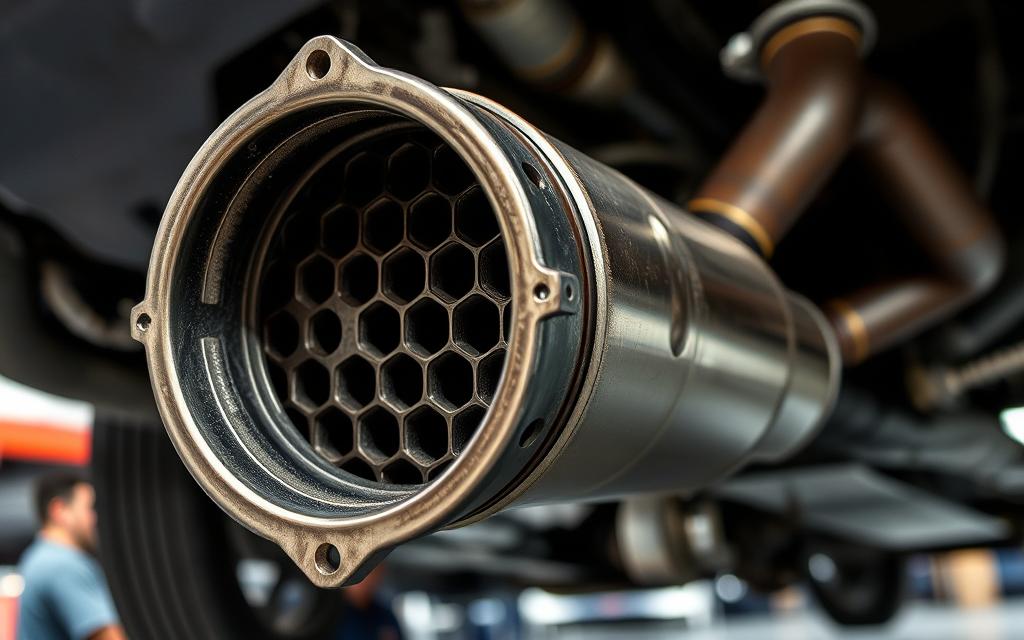
A clogged exhaust manifold can really hurt your car’s performance and the life of its catalytic converter. The catalytic converter is key in keeping emissions low by turning bad pollutants into safer ones. But, if the exhaust manifold gets blocked, it can cause big problems for the converter.
Symptoms of Catalytic Converter Issues
One big sign of trouble with the catalytic converter is when your car doesn’t run as well. A clogged converter makes the engine work too hard. This can cause slow starts, weird idling, and even stalling.
Also, you might smell something bad coming from the exhaust. This smell is often like sulfur or rotten eggs. It means the converter isn’t doing its job right, letting bad gases out through the tailpipe.
How They’re Related to Exhaust Manifold Problems
The exhaust manifold and the catalytic converter work together to keep emissions low and the engine running smoothly. If the manifold gets clogged or damaged, it can mess up the converter’s work. This makes the converter work too hard and can cause it to fail early.
It’s very important to fix exhaust manifold problems right away. This helps avoid damage to the catalytic converter and the whole exhaust system. Keeping up with regular maintenance and fixing any exhaust system issues quickly can help the converter last longer.
Frequent Stalling or Misfiring
A clogged exhaust manifold can cause problems like stalling or engine misfiring. This happens because exhaust gases build up in the combustion chamber. This disrupts the air-fuel mixture needed for good combustion.
Risk of Stalling Due to Manifold Clogging
When the exhaust manifold gets clogged, it blocks the exhaust gases from leaving the engine. This creates backpressure. It can make the engine stall, often when driving slowly or idling.
Drivers might find themselves facing sudden, scary stalling. This can be very dangerous.
Misfires and Their Symptoms
A clogged exhaust manifold can also cause engine misfiring. Signs include the engine jerking or bucking when you accelerate, idling roughly, and losing power. These problems come from the air-fuel mixture being disrupted. This leads to incomplete combustion in some cylinders.
The user thought it was a vacuum leak causing stalling and misfiring. They replaced many engine parts. But, the check engine lights kept showing problems with Fuel Injector #3, Throttle Position Sensor, and Misfire codes on Cylinders #2 and 6. Even with new spark plugs and checked hoses, the engine still misfired at all RPMs.
Common misfire-related trouble codes are P0300 (random/multiple cylinder misfire) and P0301-P0308 (specific cylinder misfire). Finding the cause of engine misfires is key. Solutions include replacing old or dirty spark plugs. You might also need to fix vacuum leaks and compression problems.
Diagnostic Methods
Figuring out exhaust manifold problems needs special tools and skills. Mechanics use different ways to check for clogs or blockages. These methods go beyond just looking at the system.
Common Tests for Assessing Clogging
The Engine Vacuum Test is a key test for exhaust system health. It looks for a big drop in vacuum, usually 8-10 inches, which shows an exhaust problem. Backpressure Testing is also common, where mechanics check the system’s backpressure. The goal is to keep it under 1 PSI at idle or 3 PSI at 2,500 RPM.
Diagnostic scanners are also used to find error codes related to the exhaust. These codes can point to issues with oxygen sensors or catalytic converters. They help figure out the main problem.
Professional vs. DIY Diagnostics
- Some basic checks can be done by car owners, like looking for damage or leaks. But, detailed diagnostics need special tools and knowledge.
- DIY fans might try exhaust system diagnostics with tools like pressure gauges or vacuum testers. But, understanding the results well needs a trained tech.
- Getting a professional inspection is the best choice for a thorough check of exhaust system issues, like clogged manifolds.
Knowing about different diagnostic methods and the value of professional help helps car owners. They can make better choices for keeping their exhaust systems in good shape.
Preventive Measures
Keeping your vehicle’s exhaust system healthy is key to avoiding clogs and ensuring it runs well. By acting early, you can dodge expensive fixes and unexpected breakdowns.
Maintaining Exhaust System Health
Regular checks and fixing small problems early are crucial. Fix leaks or cracks fast to stop more damage and keep exhaust flowing well. Using top-notch fuel and regular engine tune-ups also help your exhaust system last longer.
Tips for Avoiding Clogged Manifolds
- Avoid short trips that don’t let the exhaust system warm up and clear out moisture, which can cause clogs.
- Watch for any engine performance changes, odd noises, or warning lights. These might mean a problem with the exhaust manifold.
- Make sure to get regular preventive maintenance checks to catch and fix issues before they get worse.
- Think about getting a good exhaust system cleaner or additive to keep flow smooth and prevent clogs.
By taking these steps, you can make your vehicle’s exhaust system last longer and avoid the high costs of a clogged manifold. Remember, exhaust system maintenance and preventing clogs through regular vehicle checks are vital for your car’s best performance.
Repair and Replacement Options
When dealing with a clogged exhaust manifold, you have two main choices: repair or replace it. Sometimes, just cleaning or patching the manifold works. But, if the damage is too bad or there’s a lot of rust, you might need to replace it entirely.
When Repair is Possible
If the damage to the exhaust manifold isn’t too bad, fixing it might be an option. This could mean:
- Cleaning the manifold to get rid of carbon and debris
- Welding small cracks or holes to stop leaks
- Replacing the manifold gasket for a better seal
But, keep in mind that these fixes are only temporary. The problem might come back if you don’t fix the real cause. It’s key to keep up with regular maintenance and watch your exhaust system closely.
Signs That a Replacement is Necessary
At times, fixing the exhaust manifold might not last long. You’ll know it’s time for a new one if you see:
- Big cracks or a lot of rust on the manifold
- Problems keep coming back even after you’ve tried to fix them
- Your engine isn’t running as well as it should
If you see these signs, getting a pro to check it out is a must. They can tell you if replacing the exhaust manifold is the best choice. This will help get your exhaust system service back on track and your engine running smoothly.
It’s important to deal with exhaust manifold problems quickly. This keeps your car running well and efficiently. Knowing your options for repair or replacement helps you make the right choice for your car.
Conclusion: Ensuring Effective Exhaust System Function
Keeping your exhaust system in good shape is key for your car’s performance and safety. Look out for signs like unusual noises, less engine power, and more fuel use. Also, watch for dashboard lights. Regular checks and quick fixes can save you money and keep your car running well.
Summary of Key Symptoms
A bad exhaust system can cause your car to slow down, make odd noises, and smell differently. These signs are important. They mean there might be bigger problems that need fixing.
Importance of Regular Vehicle Maintenance
Regular care of your exhaust system is vital. It helps your car run better, use less fuel, and meet environmental rules. Fixing problems early keeps your car efficient, cuts down on pollution, and keeps everyone safe.
FAQ
What are the common symptoms of a clogged exhaust manifold?
What is the role of the exhaust manifold, and why is proper exhaust flow important?
When should I seek professional help for exhaust system problems?
How can a clogged exhaust manifold affect engine performance?
What unusual engine noises can indicate a clogged exhaust manifold?
How can a clogged exhaust manifold impact fuel efficiency?
Can a clogged exhaust manifold cause engine overheating?
How can a clogged exhaust manifold be diagnosed?
What preventive measures can help avoid a clogged exhaust manifold?
When is it necessary to replace the exhaust manifold?

Jack Thompson is a writer and seasoned auto mechanic with over 15 years of experience in the automotive industry. Known for his expertise in vehicle mechanics, Jack has a deep understanding of car and truck systems. His skills, honed through years of hands-on experience, have made him a trusted name in the field. Jack is committed to providing valuable insights into car maintenance and repair, helping vehicle owners keep their vehicles in top condition.

